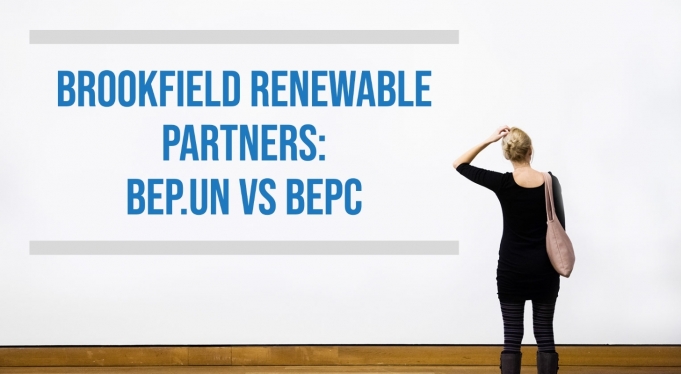Brookfield Renewable Partners (BEP.UN) announced special distributions of class A exchangeable voting shares of Brookfield Renewable Corporation (BEPC). This distribution is comparable to a unit split in that the company does not receive any cash flow or change in asset value except for the adjustment in the number of shares/units outstanding. In other words, BEPC is a Canadian corporation set up to be the “equivalent” to the limited partnership BEP.
Units for units
The holders of BEP units as of July 29, 2020 will receive one share of BEPC for every four BEP units held, or 0.25 shares for each BEP unit. BEP units do not turn into BEPC shares, which means if an investor holds 100 units of BEP on July 29, on July 30, they’ll hold 100 units of BEP and 25 BEPC shares. If a unitholder of BEP would like to acquire additional BEPC exchangeable shares, they would be required to acquire them in the market once they start trading. On the other hand, as a BEPC exchangeable shareholder, you will be entitled to exchange BEPC exchangeable shares for an equivalent number of BEP units through your broker.
Why the change?
Being a limited partnership prevented certain investors in certain jurisdictions, such as institutional investors and pension funds, to hold BEP units. This is due to a tax-reporting framework as a consequence of holding such units. Creating a corporation and distributing BEPC exchangeable shares provides investors with the flexibility to own the economic equivalent of a BEP unit. The shares also provide investors with a tax-reporting framework that may be favored by investors in some jurisdictions. BEP believes this will attract new investors who will benefit from investing in its globally diversified portfolio of renewable power assets.
How will BEPC track BEP?
Each BEPC exchangeable share is structured with the intention to replicate an economic return equivalent to one BEP unit. As a result, BEP expects that BEPC exchangeable shares will trade at a market price impacted by the combined business performance of Brookfield Renewable group, hence tracking the market price of the BEP units. Past July 30, 2020, investors will be able to buy/sell BEP units and BEPC units on the TSX and NYSE.
Dividend
Ownership of a BEPC exchangeable share is also equivalent on the dividend front as identical dividends are expected to be paid on each BEPC exchangeable share. Dividends on BEPC exchangeable shares will be declared and paid at the same time as distributions are declared and paid on the BEP units. Each set of dividends will be declared and paid with an economic return equivalent to holders of BEP units. However, BEPC shares get the dividend tax credit on the full dividend, which BEP units do not. In a taxable account, a switch might make less sense. In a taxable account for a new position, BEPC might be more attractive due to the dividend tax credit. The Brookfield Renewable group’s objective is to pay a distribution that is sustainable on a long-term basis and targets a payout ratio of approximately 70% of Brookfield Renewable’s FFO.
Unregistered Account Vs Registered Account
While ‘economically’ equivalent, investors cannot directly exchange BEP units for BEPC shares, so a sale needs to take place if the intention is to own more BEPC shares. Brookfield says the following in their filing regarding the tax status of the distribution: "The special distribution will reduce the adjusted cost base of a resident holder’s interest in BEP and the special distribution should not be taxable to a non-resident holder for Canadian federal income tax purposes". In a taxable account, we would not see a big advantage to switching BEP units to BEPC shares if the BEP units were sitting at a gain. BEPC shares are expected to trade at a premium (as seen with BIP/BIPC), but the tax hit from selling will likely make the swap unattractive for many investors depending on their tax rate.
If BEP units and BEPC shares trade at near-equivalent prices, then a switch within registered accounts could make sense. However, if BEPC shares trade at a premium right away, one has to compare the possibility of gains in BEPC shares against the slightly higher yield on BEP units (the distributions on each will be the same). The dividend tax credit is available for dividends paid on Canadian stocks held outside of an RRSP, RRIF or TFSA.
Investor/institutional holdings
Immediately prior to the special distribution, BEP will receive 44.7 million BEPC exchangeable shares. BEP will subsequently make a special distribution of these BEPC exchangeable shares to holders of its equity units. The distribution level for each BEP unit will immediately be reduced to 4/5ths of the pre-special distribution level, or to $0.4340 per BEP unit in the next quarter, which will be the same as the initial dividend level for a BEPC exchangeable share. Brookfield Renewable will hold all of the BEPC class B and class C shares, thereby giving Brookfield Renewable a 75% voting interest. In addition, Brookfield will hold approximately 60.5% of BEPC exchangeable shares immediately upon completion of the special distribution as a result of BEPC exchangeable shares distributed to Brookfield’s BEP holdings via partnership units and general partner interests through BRELP. This percent would reduce to 39.5% assuming the TERP acquisition is completed and the acquisition consideration consists solely of BEPC exchangeable shares. Together, Brookfield and Brookfield Renewable will hold an approximate 90% voting interest in BEPC.
Hopefully this offers as a good primer on the BEP.UN and BEPC transaction and what an investor can expect.
Happy investing!
Thinking about becoming a 5i Research Member? There is no better time to join but don't just take our word for it. Try it for free for the next month and experience all the benefits of the 5i Research membership. (And don't worry. We won't ask for your credit card upfront)
Disclosure: Employees of 5i Research involved in the research process cannot trade in Canadian traded stocks and do not hold a financial interest in Canadian companies mentioned. Employees, directors, officers and/or partners may hold a financial or other interest in funds or US and international securities mentioned.







Comments
Login to post a comment.